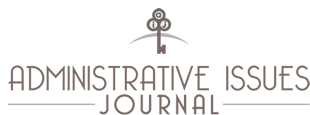
Abstract
Organizations are among the most socially complex institutions within modern culture. As corporations face the challenges of technological change and globalization, it becomes essential that they find new ways and forms of fostering knowledge sharing and creativity. Challenging the age-old belief that employees should “dominated and directed,” complexity theory challenges the classic machine metaphor of organizational structure with a view that conceptualizes them as nonlinear systems that fluctuate between conditions of stability and chaos. This model offers new and exciting opportunities for exploring the dynamics of organizational learning. Toward this end, this paper examines the systemic features of organizations with a particular focus on knowledge generation.
Recommended Citation
Walton, Justin D.
(2011)
"Complexity, Knowledge and Structure: A Systemic Understanding of Organizational Learning,"
Administrative Issues Journal: Vol. 1:
Iss.
3, Article 15.
Available at:
https://dc.swosu.edu/aij/vol1/iss3/15
Included in
Health and Medical Administration Commons, Higher Education Administration Commons, Public Administration Commons
Please consider contributing an article to Administrative Issues Journal, our submission policy: http://www.swosu.edu/academics/aij/guidelines.aspx
